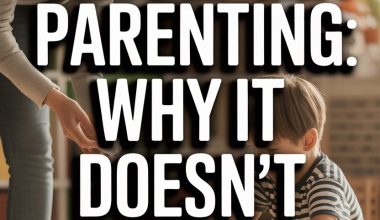If you’ve ever found yourself doing something for your child “just to be nice,” only to have it spectacularly backfire, join the club.
In the world of parenting, kindness isn’t always the golden ticket. Sometimes, our well-meaning instincts can trip us up—leaving our kids a bit worse for wear.
Here are six classic “nice” moves that might not be doing your child any favours (and what to try instead).
1. Saying Yes to Every Request
From the outside, the “yes parent” seems like a dream. Birthday party? Sure! Fourth biscuit? Why not! TikTok account at age nine? Er… (deep breath) Okay!
Every parent wants their child to feel loved and heard. But an endless stream of yeses turns you into a vending machine, not a parent.
Kids need boundaries like they need vegetables—often met with resistance but vital for healthy development.
Studies show that children given clear, consistent limits are less anxious and better at self-regulation. Psychologists point out that firm boundaries make kids feel secure, not oppressed.
So next time you’re tempted to give in for the sake of keeping the peace (or just making it through the supermarket alive), try this: pause, breathe, and offer a “no” with empathy.
“I know you really want another biscuit, and that’s hard. But it’s almost dinner, and I want you to be hungry for it.” Simple, not easy. But your child’s future self will thank you.
2. Praising Every Tiny Thing
Anyone else guilty of clapping like a seal when their child puts on socks the right way? Excessive, indiscriminate praise—“You’re so clever!” “You’re amazing!”—seems like a self-esteem booster.
In reality, smothering kids with empty compliments can actually make them less confident and less willing to try new things.
Research from Stanford psychologist Carol Dweck shows that praising effort (“You worked hard on that puzzle!”) helps children develop a growth mindset, while blanket statements about intelligence or talent can make them risk-averse and afraid of failure.
Try swapping generic praise for specific, effort-based feedback. Instead of “You’re the best artist ever!” go with, “I noticed how carefully you coloured inside the lines. That took patience.”
Kids pick up on authenticity, and they thrive on it.
3. Fixing Their Problems for Them
It’s hard to resist. Your child comes home in tears after a playground squabble, and you’re already plotting an email to the school, the other parent, and possibly the UN.
But swooping in to solve every scrape, conflict, and disappointment robs kids of a crucial life skill: resilience.
Helicopter parenting hasn’t just landed—it’s set up a helipad in many households. Experts warn that chronic rescuing can leave children anxious, dependent, and unable to cope with setbacks.
Instead, try being the landing pad, not the helicopter. Offer comfort and guidance, but let them take the reins—“That sounds tough.
What do you think you’ll do about it?” Give them the space to experiment and fail safely while you’re still around to offer a hug.
4. Buying Them Everything They Want
If you’ve ever caved to a tantrum in the toy aisle, you’re not alone. After all, it feels nice to give!
Showering your child in stuff—gadgets, clothes, endless trinkets—can feel like love in action. But too much “stuff” creates its own set of problems.
Research from the University of Missouri shows that materialistic kids have more behaviour problems and less gratitude.
They’re also less likely to find happiness in non-material things—a recipe for a lifelong case of the grumps.
Try a “wish list” strategy. When your child asks for something, write it down together. Wait a week. Often, the desire fizzles, and if not, you’ll know it’s something they truly want.
And don’t be afraid to say no, even if every other kid on the street has the latest whiz-bang whatsit.
5. Protecting Them from All Discomfort
No one likes to see their child struggle. Whether it’s feeling left out at school, being bored on a rainy afternoon, or grappling with lost football matches, our instinct is to step in and smooth the way.
But here’s the plot twist: shielding kids from every discomfort can actually stunt their emotional growth.
Child development experts say that learning to tolerate and bounce back from uncomfortable feelings creates grit and confidence.
This doesn’t mean abandoning them to the wolves.
Offer comfort, validate their feelings, and remind them that they’re strong enough to handle tough moments. “I can see you’re upset that you didn’t get picked for the team. That’s really hard. I’m proud of you for trying.”
And yes, it’s okay for them to be bored. Some of the world’s best ideas were born from staring at the ceiling.
6. Doing Everything for Them
It’s faster, neater, and far less messy to zip their coats, pack their bags, and tidy their bedrooms yourself.
But when parents do every task for their kids—out of kindness, convenience, or sheer exhaustion—children miss out on building independence and pride in their abilities.
Developmental psychologists note that kids who do age-appropriate chores are more likely to become capable, confident adults. They also tend to be more helpful and empathetic.
Handing over responsibility doesn’t have to mean chaos. Start small.
Toddlers can pop their dirty clothes in the basket. Older kids can help pack their own lunches (do brace yourself for some creative sandwich combos). Praise effort, not perfection.
If you’re on the fence, remember: one day, you’ll want them to move out and do their own laundry. This is your shot at a future with less sock-matching.
Raising Kind Kids Without Tripping Over Yourself
Being nice isn’t the enemy—but it does need a reality check.
The world’s best parents make mistakes, learn, and occasionally lock themselves in the bathroom for five minutes of peace (you’re among friends here).
Start tonight. Pick one “nice” habit to tweak. Maybe it’s holding the line on screen time, or letting your child load the dishwasher, water on the floor be damned.
Show your love by giving your kids what they need, not just what they want.
As it turns out, the “nicest” thing you can do for your kids might be a little less nice. And a whole lot more loving.




